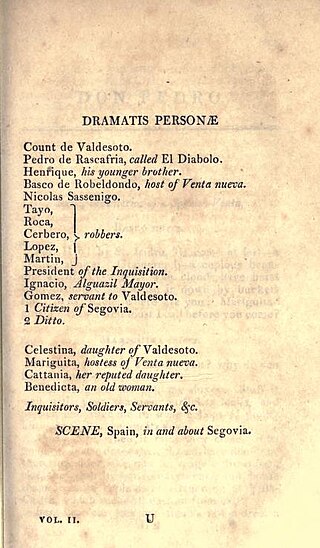
Don Pedro is a tragic play by the British writer Richard Cumberland. It was first staged at the Theatre Royal, Haymarket in London on 23 July 1796. The original cast included James Aickin as Count Valdesoto, Charles Kemble as Henrique, John Palmer as Pedro De Rascifiria, John Bannister as Basco de Robeldondo, Richard Suett as Nicolas Sassenigo, Thomas Caulfield as Tayo, George Wathen as Roca, Robert Palmer as Cerbero and Elizabeth Kemble as Celestina, Sarah Harlowe as Mariguita, Maria Kemble as Cattania and Elizabeth Hopkins as Benedicta. The epilogue was written by George Colman the Younger.

Zorinski is a 1795 historical tragedy by the British writer Thomas Morton. It first appeared at the Theatre Royal, Haymarket in London with a cast that included William Barrymore as Zorinski, James Aickin as Casimir, King of Poland, Robert Bensley as Rodomsko, Charles Kemble as Radanzo, John Bannister as Zarno, John Henry Johnstone as O'Curragh, Richard Suett as Amalekite, John Fawcett as Witski, Thomas Caulfield as Naclo, Elizabeth Kemble as Rosolia and Maria Bland as Winifred. It included music composed by Samuel Arnold. The Irish premiere was at the Crow Street Theatre in Dublin on 28 November 1795. It is also known by the alternative title Casimir, King of Poland

The Mouth of the Nile; Or, The Glorious First of August is a 1798 patriotic musical written by the British author Thomas John Dibdin with music composed by Thomas Attwood. It celebrated the recent naval victory of Horatio Nelson over the French at the Battle of the Nile. It premiered at the Theatre Royal, Covent Garden on 25 October 1798 as an afterpiece. The original cast included Edward Townsend as Jack Junk, John Fawcett as William, Dibdin as Pat, Charles Incledon as Michael and Sarah Sims as Susan. The prologue was written by Richard Cumberland. The Irish premiere took place at the Crow Street Theatre in Dublin on 18 December 1799.

The Rival Sisters is a 1793 tragedy by the Irish writer Arthur Murphy. His final play, it premiered at the Theatre Royal, Haymarket in London on 18 March 1793. It had been first written in 1783 and then published in 1786. It was staged by the company of the Drury Lane company under Richard Brinsley Sheridan who were at the Haymarket while their own theatre was rebuilt. The London cast included Sarah Siddons as Ariadne, Jane Powell as Phaedra, John Philip Kemble as Perithous, Richard Wroughton as Periander, King of Naxos, Robert Palmer as Theseus, John Hayman Packer as Archon and Thomas Caulfield as Aletes. It ran for around nine performances.

The Iron Chest is a 1796 play by the British writer George Colman the Younger, with music by the composer Stephen Storace. Inspired by the novel Things as They Are by William Godwin, it premiered at the Theatre Royal, Drury Lane in London on 12 March 1796. The original cast included John Philip Kemble as Sir Edward Mortimer, Richard Wroughton as Fitzharding, John Bannister as Wilford, James William Dodd as Adam Winterton, William Barrymore as Rawbold, Richard Suett as Samson Rawbold, Robert Palmer as Orson, Charles Bannister as Third Robert, Elizabeth Farren as Lady Helen, Maria Gibbs as Blanch, Charlotte Tidswell as Dame Rawbold, Nancy Storace as Barbara and Maria Theresa Kemble as Judith. The Irish premiere took place at the Crow Street Theatre in Dublin on 6 March 1797.
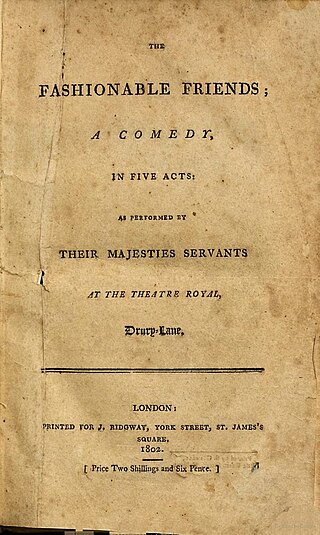
Fashionable Friends is an 1802 comedy play by the British author Mary Berry, although she initially claimed it to have been written by her friend Horace Walpole and found amongst his possessions after his death. It appeared at the Theatre Royal, Drury Lane on 22 April 1802. The Drury Lane cast included Thomas King as Sir Valentine Vapour, Charles Kemble as Sir Dudley Dorimant, William Barrymore as Mr. Lovell, Richard Suett as Doctor Syrop, Walter Maddocks as Music Master, Ralph Wewitzer as Lapierre, Maria Theresa Kemble as Lady Selina Vapour, Jane Pope as Mrs. Racket, Dorothea Jordan as Miss Racket, Sarah Harlowe as Trimming and Charlotte Tidswell as Lappet. The prologue was written by William Robert Spencer. The title is also written as The Fashionable Friends.

Adelaide is an 1800 historical tragedy by the English writer and poet laureate Henry James Pye. It premiered at the Theatre Royal, Drury Lane in London on 25 January 1800. The original cast included Sarah Siddons as Adelaide, James Aickin as King Henry, John Philip Kemble as Prince Richard, William Barrymore as Prince John, Charles Kemble as Clifford, Thomas Cory as Legate and Walter Maddocks as Officer and Elizabeth Heard as Emma. It is set during the reign of Henry II.

The Marriage Promise is an 1803 comedy play by the British writer John Till Allingham. It premiered at the Theatre Royal, Drury Lane in London on 16 April 1803. The original cast included Charles Kemble as Charles Merton, John Dwyer as Sidney, William Dowton as Consols, John Bannister as Tandem, Robert Palmer as Woodland, Alexander Pope as George Howard, William Powell as Jeffries, Walter Maddocks as Bailiff, Jane Powell as Mrs Howard, Harriet Mellon as Mary Woodland, Sarah Sparks as Mrs Harvey and Dorothea Jordan as Emma The Irish premiere took place at the Crow Street Theatre in Dublin on 8 June 1803.

Julian and Agnes is an 1801 Gothic tragedy by the British writer William Sotheby. Best known as a poet he wrote several tragedies, but this was his only play to be performed in London's West End. It premiered at the Theatre Royal, Drury Lane on 25 April 1801. The original cast included John Philip Kemble as Jullian, Sarah Siddons as Agnes, Richard Wroughton as Provost, John Hayman Packer as Prior, William Barrymore as Confesser, Charles Holland as Infirmier, Walter Maddocks as Steward, William Powell as Francis and Anne Biggs as Ellen.

Begone Dull Care is an 1808 comedy play by the English writer Frederick Reynolds. It premiered at the Theatre Royal, Covent Garden in London on 9 February 1808. The original Covent Garden cast included Alexander Pope as Sir Arthur St Albyn, Charles Kemble as Algernon St Albyn, William Thomas Lewis as Modern, John Brunton as Danvers, John Fawcett as Lord Blushdale, John Emery as Solace, William Chapman as Trusty, Samuel Simmons as Geoffrey, Sarah Smith as Selina, Mary Ann Davenport as Deborah. The Irish premiere took place at the Crow Street Theatre in Dublin on 30 March 1808.
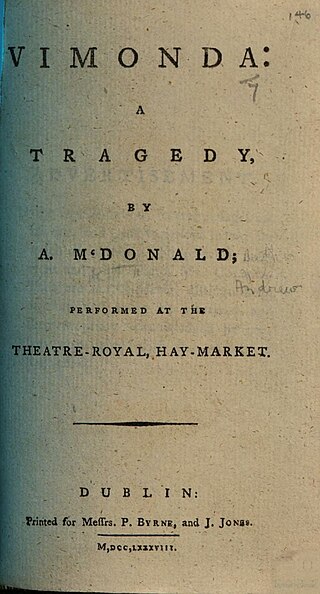
Vimonda is an 1787 tragedy by the Scottish writer Andrew Macdonald. After first appearing at the Theatre Royal, Edinburgh in was then staged at London's Theatre Royal, Haymarket on 5 September 1787. The original Haymarket cast included Elizabeth Kemble as Vimonda, Stephen Kemble as Rothsay, John Bannister as Melville, Robert Bensley as Dundore, James Aickin as Barnard and Frances Barnet Woollery as Alfreda.

The Regent is a 1788 tragedy by the British author Bertie Greatheed. It premiered at the Theatre Royal, Drury Lane in London on 29 March 1788. The original cast included Sarah Siddons as Dianora, John Philip Kemble as Manuel, Richard Wroughton as Gomez, James Aickin as Solerno, John Hayman Packer as Gerbin, Robert Benson as Pedro, William Bates as Diego, Richard Wilson as Servant, John Phillimore as Banditti and Sarah Ward as Paula. The Irish premiere took place at the Crow Street Theatre in Dublin on 5 July 1788. Although it was not a great success, it was nonetheless published and a German translation was issued in 1790.
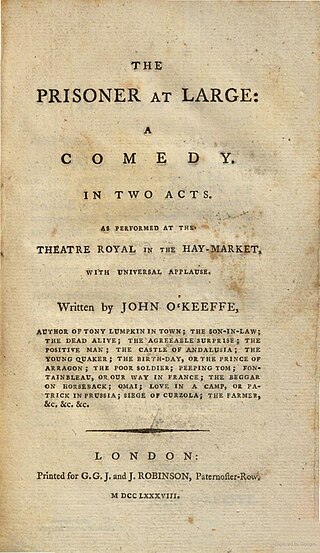
The Prisoner at Large is a 1788 comedy play by the Irish John O'Keeffe. A farce, it premiered as an afterpiece at the Theatre Royal, Haymarket in London on 2 July 1788. The original cast included James Brown Williamson as Lord Esmond, William Henry Moss as Old Dowdle, Ralph Wewitzer as Count Fripon, Robert Palmer as Jack Connor, John Phillimore as Frill, John Edwin as Muns and Elizabeth Kemble as Adelaide. The Irish premiere took place at the Crow Street Theatre in Dublin on 7 August 1789.

Mary, Queen of Scots is a 1789 historical tragedy by the British writer John St John. It premiered at the Theatre Royal, Drury Lane in London on 21 March 1789. Its Irish premiere took place at the Crow Street Theatre in Dublin on 22 December 1802. The original Drury Lane cast included Sarah Siddons as Queen Mary, John Philip Kemble as the Duke of Norfolk, James Aickin as Sir William Cecil, William Barrymore as Lord Herries, John Hayman Packer as Davison, Robert Benson as Earl of Shrewsbury, John Phillimore as Earl of Huntingdon, John Fawcett as Sir Amias Paulet, Matthew Williames as Beton, Sarah Ward as Queen Elizabeth, Jane Farmer as Lady Douglas and Charlotte Tidswell as Lady Scrope.

False Appearances is a 1789 comedy play by the British politician and general Henry Seymour Conway, inspired by the 1740 French play Trompeurs Dehors by Louis de Boissy. It appeared at the Theatre Royal, Drury Lane in London on 20 April 1789. The Irish premiere took place at the Crow Street Theatre in Dublin on 13 July 1789 The original Drury Lane cast included John Philip Kemble as Marquis, Richard Wroughton as Baron, William Parsons as Governor, John Bannister as Abbé, Robert Palmer as Robert, Elizabeth Farren as Countess, Anna Maria Crouch as Lucile, Priscilla Kemble as Caelia and Jane Pope as Lisette. The epilogue was written by John Burgoyne.
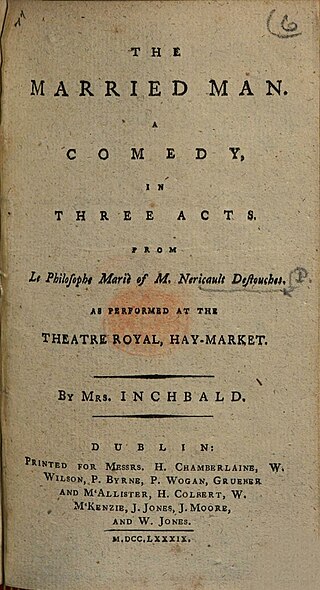
The Married Man is a 1789 comedy play by the English writer Elizabeth Inchbald, inspired by the 1727 French play Le Philosophe Marié by Philippe Néricault Destouches. It premiered at the Theatre Royal, Haymarket in London on 15 July 1789. The original cast included John Palmer as Lord Lovemore, John Bannister as Sir John Classick, James Aickin as Mr Classick, Stephen Kemble as Tradwell Classick, James Brown Williamson as Dorimant, Elizabeth Kemble as Lady Classick and Mary Whitfield as Lucy.

To Marry or Not to Marry is an 1805 comedy play by the British writer Elizabeth Inchbald. It premiered at the Theatre Royal, Covent Garden in London on 16 February 1805. The original cast included Joseph Shepherd Munden as Lord Danberry, John Philip Kemble as Sir Oswin Mortland, Charles Farley as Willowear, George Frederick Cooke as Lavensforth, Julia Glover as Lady Susan Courtley and Mary Ann Davenport as Sarah Mortland. It was the last of Inchbald's new plays to be staged in her lifetime.
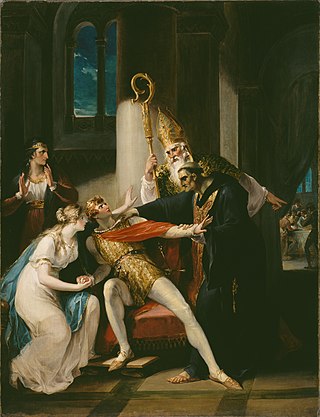
Edwy and Elgiva is a historical tragedy by the English writer Fanny Burney. Written in 1790 it was first performed at the Theatre Royal, Drury Lane in London on 21 March 1795. The original cast included John Philip Kemble as Edwy, Sarah Siddons as Elgiva, John Palmer as Aldhem, William Barrymore as Cedric, Thomas Caulfield as Ernulf, John Whitfield as Redwald, Robert Bensley as Dunstan, Robert Benson as Orgar, Charles Kemble as Sigebert, John Hayman Packer as Leofric, Walter Maddocks as Peasant, John Phillimore as Ruffian and Jane Powell as Eltruda. The prologue was written by the author's brother Charles Burney. Despite its high-profile cast including three members of the Kemble dynasty, it was withdrawn after only one performance.
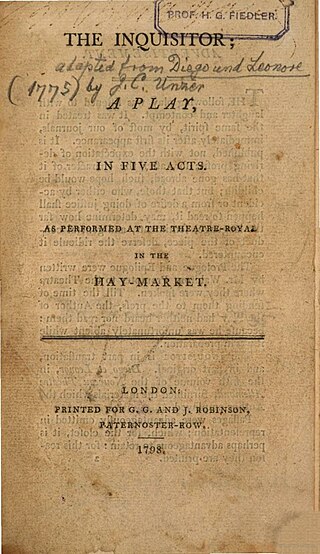
The Inquisitor is a 1798 play by the British writer Thomas Holcroft. It was inspired by the 1775 play Diego und Leonore by Johann August Unzer. It premiered at the Theatre Royal, Haymarket in London on 23 June 1798. The original cast included James Aickin as The Patriarch, Henry Erskine Johnston as Alberto, William Barrymore as Francisco, Charles Kemble as Fernando, Robert Palmer as Lelio, Thomas Caulfield as Alguazil, Maria Theresa Kemble as Leonora, Elizabeth Heard as Violante and Sarah Harlowe as Licia.
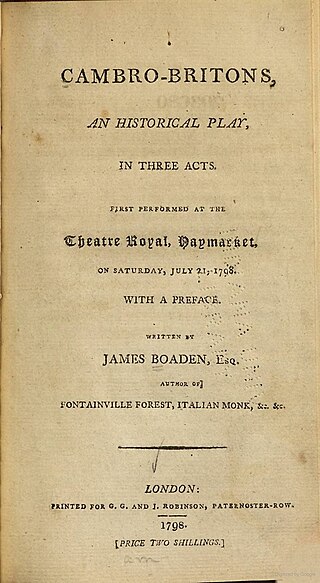
Cambro-Britons is a 1798 historical play by the English writer James Boaden. It premiered at the Theatre Royal, Haymarket in London on 21 July 1798. The original cast included William Barrymore as Llewellyn, Joseph Shepherd Munden as Shenkin, Robert Palmer as Wadwall, Richard Suett as Gwyn, John Henry Johnstone as O'Turloch, Henry Erskine Johnston as Bard, William Davies as King Edward, Charles Kemble as Prince David, Thomas Caulfield as Mortimer, George Davenport as Hereford, George Wathen as Doorkeeper, Maria Theresa Kemble as Elinor, Maria Gibbs as Lady Griffith's Shade and Maria Bland as Winifred.




















